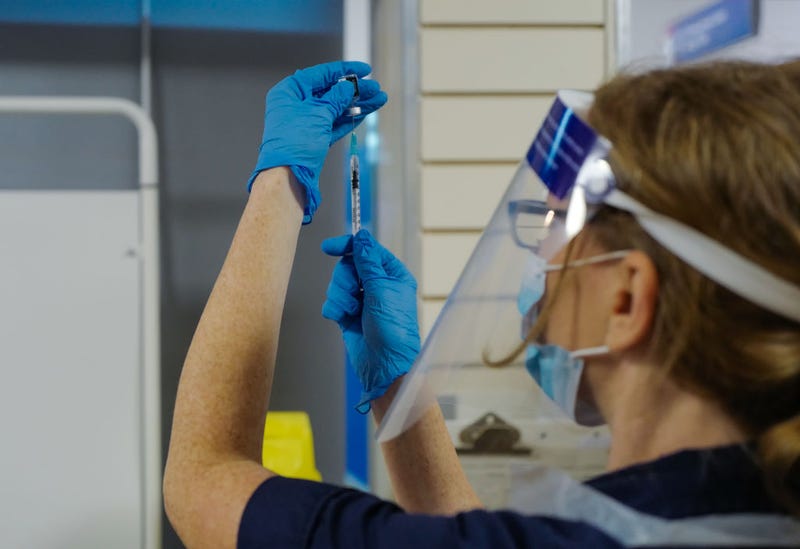
The Department of Veterans Affairs has placed orders for nearly 200,000 initial doses of two separate coronavirus vaccines, but VA leaders told senators on Wednesday that's not enough, and they expect challenges delivering those vaccines to veterans in more rural and remote areas.
Senators said they were concerned VA had not released its full vaccine distribution plan, despite other federal agencies and states releasing theirs already. On Tuesday, VA for the first time publicly released some information on its plans, but few details.
"Why can't we be more transparent?" Senate Veterans Affairs Committee ranking member Jon Tester, D-Montana, asked.
Veterans Health Administration Executive Dr. Richard Stone provided more information for senators Wednesday.
VA has identified 37 initial sites to receive the 73,000 doses of the Pfizer vaccine the department ordered, and 188 sites for the 122,000 doses of the Moderna vaccine ordered. Both vaccines require at least two doses per person. The 73,000 doses of the Pfizer vaccine could be headed to the 37 VA sites within days pending Food and Drug Administration and Centers for Disease Control and Prevention approval, department officials said.
But that's not nearly enough to meet the needs of VA's 9 million veteran patients and nearly 400,000 staff, Stone said.
"It's not an adequate amount and this will be a long process to reach all 7 million veterans who we believe will want a vaccine from us as well as all 400,000 VA employees," Stone said. "I don't think it's going to cover the entire nation in the way that it should."
As of Wednesday, it was unclear which specific VA sites would receive the vaccine shipments, though internal VA documents obtained by Connecting Vets previously named five sites chosen, including some of those hardest hit by the pandemic: Bedford, Massachusetts; Orlando, Florida; New Orleans; Albuquerque, New Mexico; and Minneapolis.
Distributing that vaccine will depend primarily on the ability to keep it refrigerated, Stone added, perhaps one of the most significant challenges.
Stone said VA determined the sites to initially begin distributing the vaccine based first on cold-storage capabilities, and then on concentration of veterans. VA also expanded contracts for dry ice, and is adding 36 more freezers in hub locations to the 37 the department already has.
The Pfizer vaccine must be kept colder than the Moderna vaccine, which may determine VA's plans, Stone said, adding that VA may have to use direct flights to get the vaccine doses to more remote areas.
"I'm going to need the Moderna vaccine in order to reach the rural veteran," he said.
The FDA and CDC were expected to meet on Thursday to potentially approve the Pfizer vaccine for distribution within 24 hours.
VA will also likely require more funds from Congress to meet the demands of vaccine distribution, but also to continue to provide care to veterans as active cases of the virus surge again.
VA received nearly $20 billion more for pandemic response earlier this year, but Stone told senators Wednesday the department will need more help. VA is four to six weeks away from another peak in number of sick patients, he said.
Who will be first to get the vaccine at VA?
One of the elements of VA's COVID-19 vaccine distribution plan the department shared this week is who is likely to receive priority for early doses of the vaccine.
Those most likely to receive the vaccine first at VA include those the department determines are most at risk among its staff and veteran patients, along with geographic areas already identified as first to receive batches of the vaccine.
VA officials said in an FAQ released Tuesday that it planned to offer the vaccine first to healthcare staff at highest risk, aiming to reduce the spread of the virus to veterans at higher risk and other employees, and to keep staff working.
Veterans will receive the vaccine based on risk of infection, including age, race and ethnicity, existing health conditions and other factors such as those living in nursing homes or other group living facilities.
In a nationwide study of more than a quarter of a million veterans released earlier this year, VA researchers found that Black and Hispanic veterans are twice as likely to test positive for the virus as white veterans. VA data showed that while Black and Hispanic veterans make up about 23% of VA patients, they account for nearly half of all VA COVID-19 cases.
VA data shows that Native veterans also are disproportionately at risk for the virus. Similar trends among Black, Hispanic and Native populations is reflected among the overall American population as well.
Survival rates do not differ significantly by race or ethnicity, however, VA officials said.
Older veterans, or those with health conditions such as cancer, diabetes or heart disease, are also more at risk.
Experts previously warned that veterans exposed to burn pits or who have experienced Gulf War Illness from military toxic exposures may also be at elevated risk for the virus.
Many veterans will have to wait to receive a vaccine, VA cautioned, since there will only be limited supplies to begin with after the FDA signs off on one or more.
Veterans will also not likely have a choice of which vaccine they receive, VA officials said.
"For the first several months we wouldn’t have enough vaccine to allow for this. We will reassess as more vaccines become available," VA said in the vaccine FAQ.
It's also still unclear how long the vaccines may protect people from the virus, so VA urged veterans to continue to observe precautionary measures to prevent the spread of infection even after being vaccinated.
Veterans enrolled in VA health care do not pay copays for vaccinations provided during health visits, and VA officials said there are no current plans to charge any fees for the COVID-19 vaccine.
—
Reach Abbie Bennett: abbie@connectingvets.com or @AbbieRBennett.
Sign up for the Connecting Vets weekly newsletter to get more stories like this delivered to your inbox.




